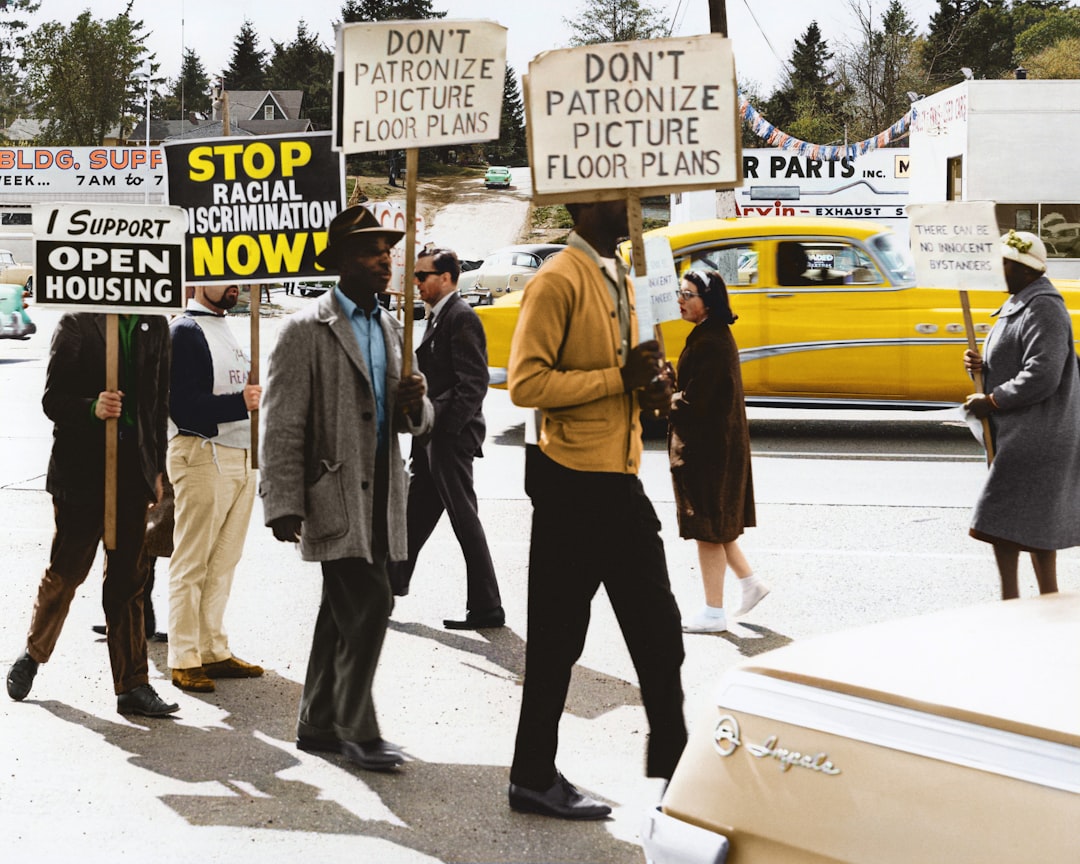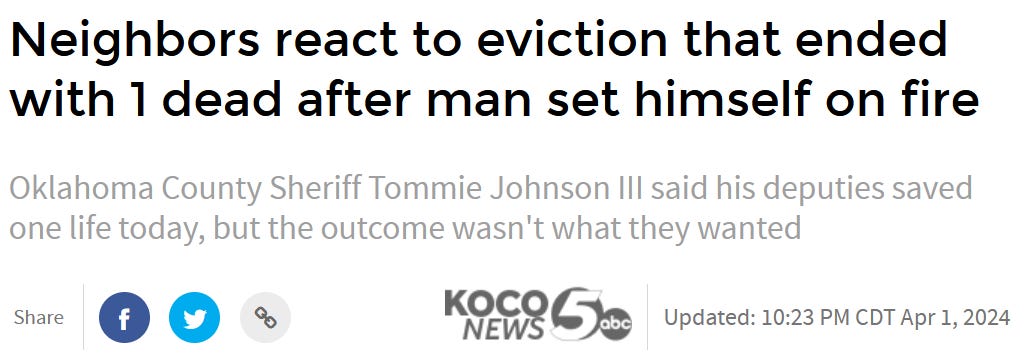Who decides what violence is?
I just saw something I never thought I’d see. Warning, it’s graphic and tragic beyond belief. It was a video of a man self-immolating as Oklahoma County sheriff's deputies tried to evict him and his wife. As I write this it’s still difficult to process what I witnessed. The man, Anthony Goulding, was 82 years old. He and his wife are being evicted from their home, and as the sheriff’s deputy approaches his room, you see him holding a can of gasoline and a lighter. Before she can stop him he pours gas on his body and the floor, flicks the lighter, and himself aflame. Local media reports that he died in the fire.
After the shock and horror of the video subsided, I was left with an odd feeling. I realized that despite the physical recoil which instinctively came over me at the pain and the sudden burst of fire, I wasn’t surprised at Anthony’s choice. It’s not one I would ever see myself making, but it’s also not one I’ve ever been in a position to consider. I haven’t been evicted, and throughout my life I’ve had pretty stable housing. And yet I found myself less surprised than I would’ve thought that this man made such a devastating choice. Maybe it’s that I’ve seen how friends and neighbors suffer after evictions. Maybe it’s that I’ve done some organizing and mutual aid with homeless folks, and seen a fraction of just how tough it can be. Maybe there’s a sense of desperation and devastation in the air, I don’t know. But I was unable to dismiss this act, unable to write it off.
It turns out that Anthony was caring for his wife, who has Parkinson's. At 82 he looked after his disabled wife (who is alive and unharmed and has not been named), and it’s difficult, almost impossible to imagine what would come next for them after they lost their home. They were slated to go to an extended-stay hotel, and who knows what difficulties that alone would have presented for the elderly couple. And, more importantly, who knows what would’ve come after that?
The instinct etched into most of us is horror at the violence of this act. A man on fire, a house burned down, a shocking body cam video. And yet we’re somehow not trained to see the eviction itself as violent. Multiple articles in response to the immolation try to paint the deputies as compassionate, highlight how there was an Uber outside waiting to take the Gouldings to their temporary housing, and evade the foundational violence of this event. Taking away an elderly person’s home is immensely violent. A system that makes housing a for-profit enterprise where this fundamental necessity of life can be taken away at a moment’s notice is a violent system. Yet, we so often don’t see it. We haven’t been trained to, and the majority of media outlets certainly don’t provide much help when it comes to building that muscle.

I wrote not too long ago about “feel good” stories. Of course, there is good news sometimes, but I was talking more specifically about articles that go something like “Middle school hero raises $2,000 to pay off classmates’ lunch debt!” to which the expected response is “Yay, what a great kid!” What we’re not expected to do is ask why these children have thousands of dollars of lunch debt in the first place.
Likewise, when we see that a man set himself on fire while being evicted, and are told that sheriffs were being nice and kind by helping him and his wife get temporary housing, we’re expected to think he’s unwell and the law enforcement are the good guys. We’re not expected to question the housing system. But even without the recent example of Aaron Bushnell, who pushed us all to see that self-immolation is not about mental illness but more often about a devastation with the horrifying facts of reality, we should be able to see through a simplistic narrative around Anthony Goulding. We should be able to see that while his setting himself on fire is a violent act, it is not the foundational violence that brought his life to an end.
We’re told from birth that violence is only present in the last act, in the final domino that falls. When we learn about crime we’re told to focus on the robbery, but never on why someone might turn to theft. It’s always the actions of an individual that we’re told to judge, and never their circumstances, or the system they live under, or the policies that have shaped their life. And we need to break that cycle, that approach, urgently. Because the truth is that the biggest offenders are wearing suits; they’re often in boardrooms or state houses. The companies that pushed Oxycodone on America have hurt more people and made more money than any drug dealer. Police forces have killed more people in the United States than any gang. Policies around evictions and climate and health care have hurt infinitely more people than any criminal mastermind could ever conceive of.

Anthony Goulding’s death was violent. I think it’s hard to see that video of him being consumed by fire and think otherwise. But the violence began far before he flicked his lighter. Before that moment was his landlord starting the process of kicking an elderly man and his wife with Parkinson's out of their home. And before that were the policies and regulations that make it possible to have such a violent eviction process. And before that was the establishment of a capitalist system that makes housing a for-profit business instead of a fundamental necessity of life that we all have a right to.
One of the countless shifts for us to make in our pursuit of a better form of society is a change in our understanding of violence. The massive system we live under purveys violence on a scale that can be hard to comprehend, but that we must find ways to wrap our minds around. If we don’t we’ll be stuck blaming ordinary people for struggling to survive. We’ll be stuck blaming people for getting evicted instead of blaming the system that created eviction. We’ll be stuck blaming the homeless instead of a system that refuses to guarantee housing. We’ll be stuck blaming the person with medical debt instead of the system that won’t provide healthcare. We may be told, again and again, that the last domino in the line is where the violence happens, but our duty is to go back and find that first domino. If we don’t everything will keep falling, and falling, and we’ll be stuck lashing out at desperation instead of building a world where no one feels so hurt and scared and trapped that they take their life in a curled ball of fire. And we need to build that world, a world where no one is put in Anthony’s position to begin with.



There is so much systemic violence, but we're encouraged to ignore it and just look at the one dramatic moment -- the self immolation, the invasion, the beginning of the military operation...
Thank you for this poignant, timely piece and perspective. I'm reminded of Coretta Scott King's comments on the nature of violence, delivered during her speech at the Poor People's March of 1968. “In this society, violence against poor people and minority groups is routine. I remind you that starving a child is violence. Suppressing a culture is violence. Neglecting school children is violence. Punishing a mother and her child is violence. Discrimination against a working man is violence. Ghetto housing is violence. Ignoring medical needs is violence. Contempt for poverty is violence. Even the lack of will power to help humanity is a sick and sinister form of violence.” https://jeffreynall.substack.com/p/from-fdr-to-coretta-scott-king-economic-a1d